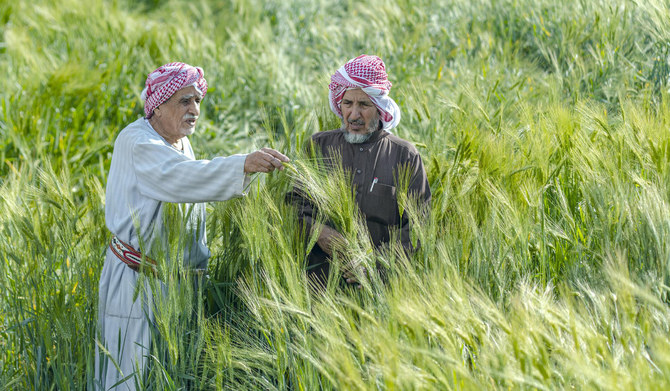Shift to a plant-based diet can lead to more sustainable Saudi food system

https://arab.news/muyp8
In the spirit of Saudi Vision 2030, the Kingdom’s road map for economic diversification, global engagement and enhanced quality of life, the Saudi public and private sectors have been working together for the past several years to promote the benefits of plant-based foods and increase the sustainability of food systems.
Given the accelerating effects and implications of climate change, and global efforts to prevent further environmental degradation, efforts need to be made to ensure the foods people choose for their diets have a low impact on the environment and help guarantee the health and well-being of the current and future generations. Against this backdrop, plant-based diets are emerging as an important and viable option for a more sustainable future.
The global plant-based food industry also represents a key economic opportunity, with an estimated market value of $11.3 billion in 2023, which is projected to increase to $35.9 billion by 2033, a compounded annual growth rate of 12.2 percent. This predicted trajectory suggests a significant ongoing shift in consumer preferences and dietary habits, reflecting a deeper societal shift toward more health-conscious and sustainable living.
That said, the plant-based food industry does have its share of challenges and so it must step up to the plate. The most notable challenges include replicating the complex flavors of some types of food, ensuring regulatory compliance, managing the intricacies of product labeling, scaling production, and maintaining competitive pricing compared with traditional products.
As the effects of climate change continue to affect every country and pose challenges to agriculture, water supplies and ecosystems, the best way for Saudi Arabia to mitigate them is to promote and implement a shift toward a plant-based diet. By adopting and promoting modern agricultural techniques, Saudi government agencies and enterprises can help establish stable plant-based food supplies and a more sustainable future for the nation.
A study conducted a few years ago in the Kingdom of public opinion on the perceived attributes that best characterize a sustainable diet revealed that on a scale of 1 to 5, a diet rich in vegetables that are organically produced earned a high rating of 3.94. This bodes well for the demand for plant-based food options, which often utilize organic produce.
By adopting and promoting modern agricultural techniques, Saudi government agencies and enterprises can help establish stable plant-based food supplies and a more sustainable future for the nation.
Majed Al-Qatari
Worldwide, a shift toward a plant-based diet would help improve sustainability by reducing carbon footprints and emissions of greenhouse gases. Traditional livestock agriculture is blamed for 15 percent of global greenhouse-gas emissions. It uses 70 percent of all land used for agriculture, which must be cleared in preparation for rearing livestock, thereby resulting in deforestation and loss of biodiversity.
The good news from both data and anecdotal evidence is that demand for organic products is increasing in Saudi Arabia, in tandem with a palpable shift in consumer tastes toward plant-based foods. If the trend continues, it would be a dream come true for the restaurants and cafes in Saudi Arabia that have been adding plant-based and organic items to their menus.
As demand for products compatible with a plant-based diet grows, so will the number of stores serving that demand, which in turn will attract investors to businesses that supply those stores. This will also help to promote more sustainable farming practices.
Organic farming techniques, as previously noted, help to conserve biodiversity and soil fertility, while preventing soil erosion and degradation. Increased consumption of organically produced foods can also help to improve public health and ensure the sustainable utilization of natural resources.
In addition, plant-based diets can improve sustainability by reducing food waste compared with animal-based diets, resulting in lower carbon emissions during the production and disposal of food.
The Kingdom therefore advocates the sustainable production and consumption of food, taking into account population growth, environmental concerns, and diversification of the national economy.
The participation of the private sector in these efforts will include corporate sustainability schemes, the utilization of innovation and technology, and cooperation with academia and civil society organizations.
As Nada Alturki explains in her report on this page: “Just a few short years ago, visitors to Saudi Arabia could never have imagined feasting on a plate of vegan tuna nigiri or a meatless shawarma. Thanks to new investments in agricultural technologies, these plant-based alternatives are now firmly on the menu.”
This signifies the evolution of consumer choices and the influence of sustainable ways of doing business. Entrepreneurs are taking advantage of this trend by opening restaurants and cafes focused on plant-based diets around the country.
Optimization of sustainable food systems in Saudi Arabia will be best achieved through the combined contributions of both private and public sectors. Through food policy adjustment, innovation, and consumer awareness, Saudi Arabia can speed up its adoption of a future sustainable food system.
These sustainable food systems will see the Kingdom accelerating its food production, providing a steady supply to restaurants and cafes, lowering the rate of food imports, and majorly enhancing organic food consumption in homes, cafes, and restaurants in the country.
• Majed Al-Qatari is a sustainability leader, ecological engineer and UN Youth Ambassador with experience in advancing ESG and sustainability goals in corporate businesses, nonprofit organizations and financial institutions.









































